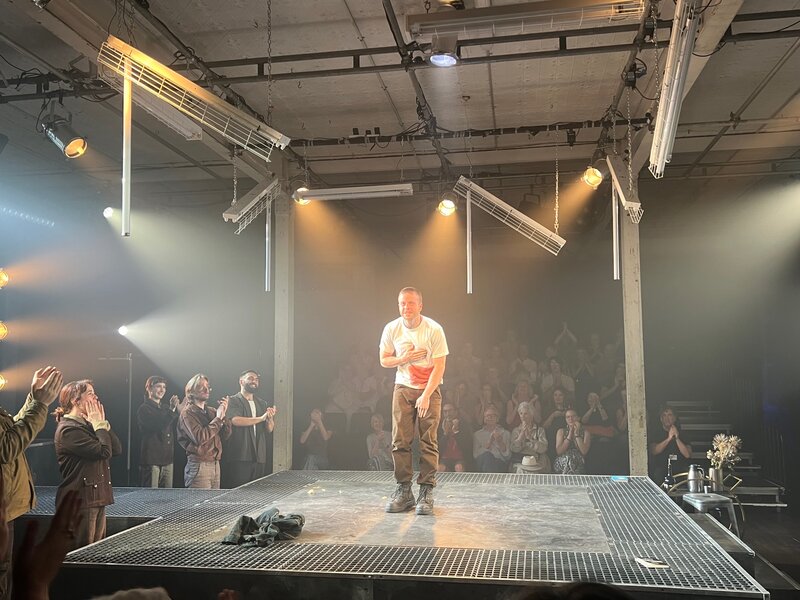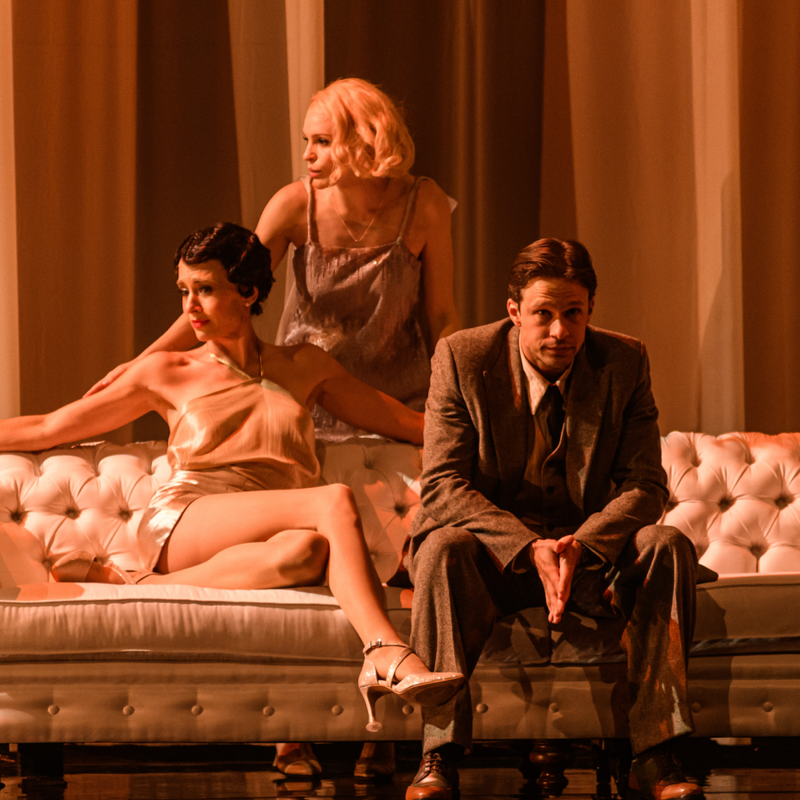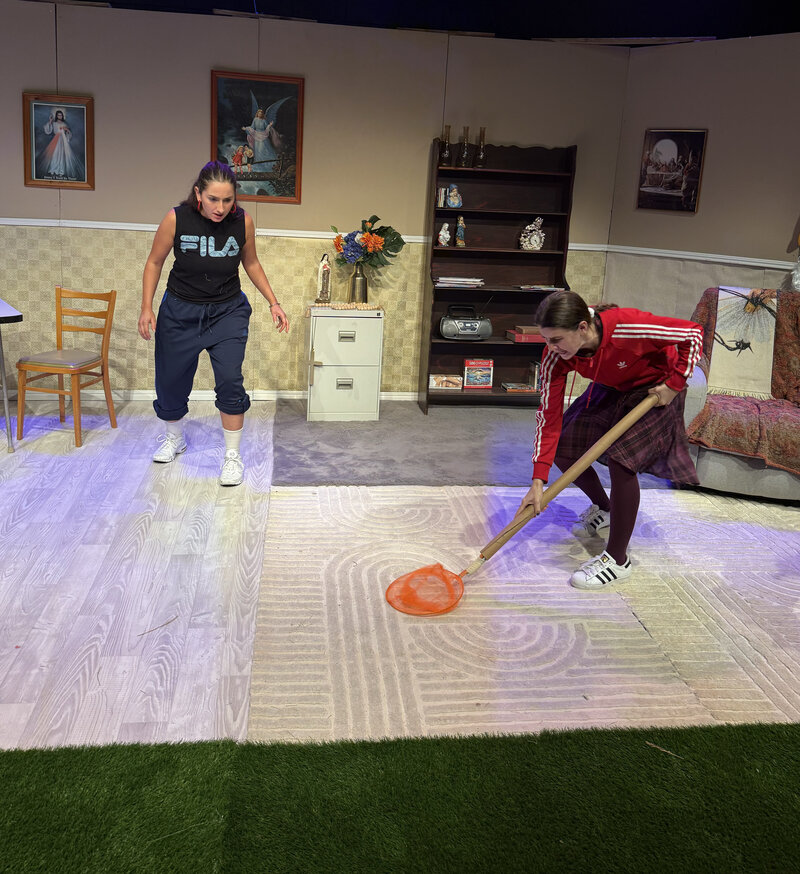If you are looking for a play where all the threads come together in the end and you can readily make sense of what has gone before, then this isn’t for you. A mystery, John brings together a young couple who have been “an item” for three years, but who are having their troubles, with an ageing woman who is running a Civil War-themed B&B in Gettysburg.
That Pennsylvania town was the site of America’s most devastating battle of the war in July 1863. An estimated 50,000 plus were killed, injured or went missing in a three-day massacre, making Gettysburg the biggest ghost town in the country. So, it is against this backdrop, in the house that was used as a hospital during the bloodshed, that Pulitzer Prize-winning Brooklyn playwright Annie Baker resurrects the ghosts of her characters’ pasts.
 A number of clues are laid out. A doll on the mantelpiece spooks Jenny (Ursula Mills), causing her to do a double take because it is identical to the one she had and which she felt sat in harsh judgment of her. She felt the same way about her stuffed animal toys. Elias (Johnny Carr) had his heart set on a particular guest room, which he booked, but when he and Jenny arrive it is not available due to a supposed leak. Mertis (Helen Morse) seems obsessed about changing the hands of time on her grandfather clock daily. Elias, a Jewish atheist and drummer, has been on medication because he suffers from depression. Jenny, who is perpetually cold and is prone to tears, desperately wants to stay with Elias, but he is unsure whether he can trust her after an earlier betrayal. Mertis is an odd sort, who asks both her guests individually whether they ever felt like they were being watched. She has been married to her second husband – a man we never get to see – for 15 years, after her first marriage lasted a quarter of a century. Her best friend is a blind woman, Genevieve (Melita Jurisic) who, by her own admission, was “clinically insane” after she left her husband a long time ago and he subsequently took possession of her soul.
A number of clues are laid out. A doll on the mantelpiece spooks Jenny (Ursula Mills), causing her to do a double take because it is identical to the one she had and which she felt sat in harsh judgment of her. She felt the same way about her stuffed animal toys. Elias (Johnny Carr) had his heart set on a particular guest room, which he booked, but when he and Jenny arrive it is not available due to a supposed leak. Mertis (Helen Morse) seems obsessed about changing the hands of time on her grandfather clock daily. Elias, a Jewish atheist and drummer, has been on medication because he suffers from depression. Jenny, who is perpetually cold and is prone to tears, desperately wants to stay with Elias, but he is unsure whether he can trust her after an earlier betrayal. Mertis is an odd sort, who asks both her guests individually whether they ever felt like they were being watched. She has been married to her second husband – a man we never get to see – for 15 years, after her first marriage lasted a quarter of a century. Her best friend is a blind woman, Genevieve (Melita Jurisic) who, by her own admission, was “clinically insane” after she left her husband a long time ago and he subsequently took possession of her soul.
So, what does one make of all of this after three hours, including two intervals? Well … your guess is as good as mine. One major plot point is rounded out, but the others remain in limbo, to make of what we will. Perhaps they are red herrings, although I think not. Suffice to say, John is about our desire for meaningful connection, but after speaking with several audience members upon exiting the theatre, the common talking point was severe disconnect to what they had just seen.
I understand that playwright Baker deals in silence, but the pacing – especially in the first act – was a problem. In fact, the whole thing could readily have been cut down without losing what meaning it had. The high point was the arrival of Genevieve in the second act. Jurisic’s open and joyous account of her character’s mental impairment was immediately engaging and delightfully good-humoured. The rest was either taken up with pleasant conversations or confrontations that set the scene and established the characters peccadillos, but did little more.
 The staging is busy and impressive – an open plan lounge and dining room, a working toy train set in a snowbound setting and a pianola that is not averse to playing a few tunes when it sees fit. It seems to have a mind of its own. Then there is a staircase to the upstairs bedrooms and a small Christmas tree, while little trinkets and collectibles are liberally scattered around the place.
The staging is busy and impressive – an open plan lounge and dining room, a working toy train set in a snowbound setting and a pianola that is not averse to playing a few tunes when it sees fit. It seems to have a mind of its own. Then there is a staircase to the upstairs bedrooms and a small Christmas tree, while little trinkets and collectibles are liberally scattered around the place.
Sarah Goodes (Switzerland) directs Baker’s seventh professional play, which follows the signature tune of Russian Anton Chekov’s work, including character introspection and stunted communication. John, which is playing in Fairfax Studio at Arts Centre Melbourne until 25th March, gets you thinking, but I dare say it will leave many perplexed and others cold.
* Please note that I saw the second preview performance of John.
Alex First

David Edwards is the former editor of The Blurb and a contributor on film and television




